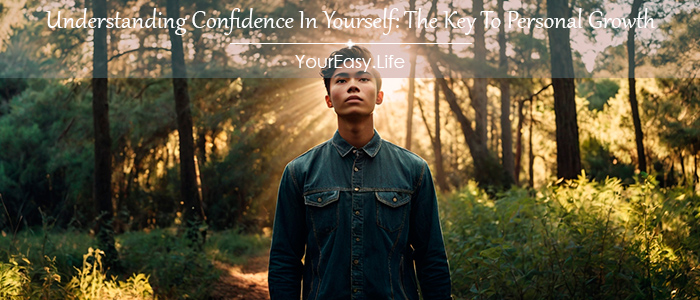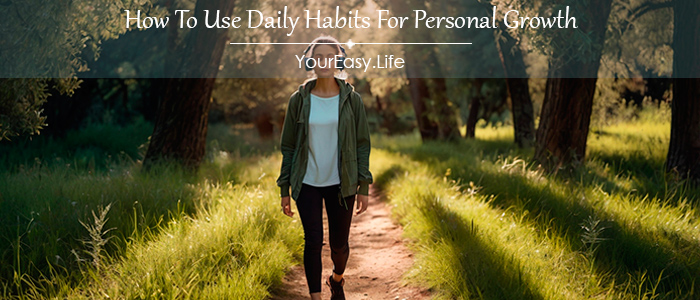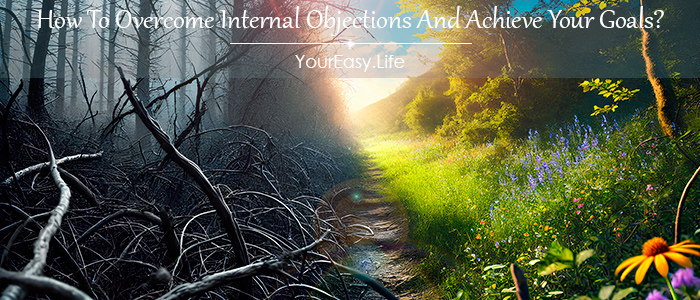Each of us has faced feelings of insecurity at least once in our lives. It could be that moment when you’re standing before an important meeting, preparing to speak in front of an audience, or simply making a life decision. In these moments, the question, “What if I don’t succeed?” can easily throw you off balance. But confidence in yourself is that inner core that helps us overcome such doubts. So, what is confidence in yourself, and how can you develop it? Let’s figure it out together.
Table Of Contents
- What Is Confidence In Yourself?
- What Hinders Confidence Development?
- The Role Of Self-Esteem In Developing Confidence In Yourself
- Scientific Studies On The Impact Of Confidence On Success
- How To Develop Confidence In Yourself
- Confidence In Yourself Checklist
- Conclusion: Confidence In Yourself Is The Key To Personal Growth
What Is Confidence In Yourself?
Confidence in yourself is essentially our internal sense of competence and self-worth. It’s when you know that you can handle a specific task, even if it seems difficult. Many people believe that confidence in yourself is something you’re born with: “Some people have it, and others don’t.” But the truth is, this quality can be developed. Like any skill, confidence takes time and practice.
Imagine confidence as a muscle. The more you train it, the stronger it becomes. But what stops us from “training” our confidence? Why is it so hard to believe in yourself?
What Hinders Confidence Development?
When we talk about confidence, we can’t ignore the barriers we set for ourselves, which prevent us from achieving success. Maybe you’ve encountered thoughts like: “What if I make a mistake?” “What will others think of me?” “I’m not good enough.” These thoughts are real traps for our minds. They stop us from taking the first step, even if we’re ready.
But the most interesting thing is that all these barriers are based on the fear of failure and self-rejection. Our inner critic is always ready to “bring our weaknesses to light.” But if we constantly listen only to that voice, we’ll never try anything new. What if failure is just a step toward success?
Fear Of Failure
From childhood, many of us were taught to avoid mistakes. School, family, and society often judge people by their achievements, not by their efforts. This can lead us to fear failure. We feel that making mistakes is shameful, sometimes even unacceptable. The fear of failure blocks our desire to try something new and grow. But in reality, mistakes are a necessary part of growth.
Perfectionism
Perfectionism is another enemy of confidence in yourself. It pushes us to aim for unattainable standards, which ultimately leads to disappointment and stress. When we set goals too high and don’t achieve them, it amplifies feelings of insecurity. Perfectionism leaves no room for mistakes, yet they are a natural part of our journey.
The Impact Of Social Expectations On Confidence In Yourself
Social pressure and social media also play a significant role. In a world where everyone tries to show only their best sides, it’s easy to start comparing yourself to others. Have you ever caught yourself thinking that you don’t measure up to the “ideal” you see on social media? These expectations create a false image of what a successful person should be like, and this can undermine our belief in ourselves.
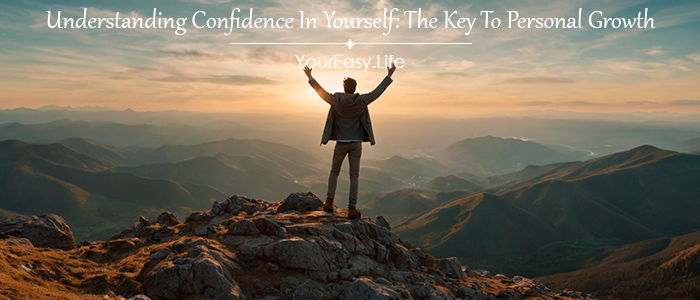
The Role Of Self-Esteem In Developing Confidence In Yourself
One of the key aspects of confidence in yourself is self-esteem. Self-esteem is how we assess ourselves and our abilities. People with high self-esteem tend to feel more confident because they believe in their value regardless of external factors.
But what if your self-esteem isn’t at its best? Here are a few simple steps to help boost your self-esteem:
- Focus on your strengths. Instead of concentrating on your flaws, highlight what you’re truly good at.
- Recognize your achievements. Keep a success journal, where you note even the smallest victories. This helps remind you that you are capable of a lot.
- Avoid comparing yourself to others. We all walk our unique paths, and comparing yourself to others is a sure way to lower your self-esteem.
- Learn to speak positive affirmations to yourself. Affirmations are a powerful tool for building confidence in yourself. For example: “I am good enough just as I am.”
Scientific Studies On The Impact Of Confidence On Success
It has been proven time and again that confidence in yourself is a key factor in success. Studies have shown that confident people are more likely to achieve their goals because they are willing to take risks and try new things. They are not afraid to make mistakes and recover faster from setbacks.
One interesting study was conducted at Harvard University. Researchers found that people who practiced “power poses” before important tasks (for example, standing with shoulders back and head held high) performed better. This proves that even physical expressions of confidence can affect our psychological readiness and success.
How To Develop Confidence In Yourself
Now that we’ve addressed the main obstacles, let’s talk about how to develop confidence in yourself. There are several proven methods that will help you feel more confident in any situation.
Start Small
If you feel uncertain about a big task, start with something small. For example, if public speaking intimidates you, begin by sharing something with a small group of friends. Small successes accumulate, and with each step, your confidence will grow.
“But these are just small steps, they won’t help with bigger tasks.” In fact, it’s these “small” steps that lay the foundation for bigger victories. Success in little things creates a psychological base for confidence in more complex tasks.
Learn To Handle Your Inner Critic
Remember we talked about your inner critic? That’s the voice telling you that you’re not good enough. But it’s important to understand that this voice isn’t the truth. It’s just a reflection of your fears. When you hear it, try asking yourself: “Are these thoughts fact, or just my fears?” Once you learn to distinguish between reality and your anxieties, you’ll start to feel more in control. And that’s another step toward confidence in yourself.
Learn From Your Mistakes
One of the biggest fears that hinders confidence is the fear of mistakes. But mistakes aren’t the end — they’re the beginning of growth. Think about it: what can you learn from your failures? Every setback is a chance to learn something new about yourself and the world around you. So why not see mistakes as a natural part of learning?
Visualize Success To Build Confidence In Yourself
Another powerful tool for developing confidence in yourself is visualization. Imagine a moment of success, like when you’ve successfully given a speech or achieved an important goal. Visualize the details: how you feel, what your victory looks like. This simple yet effective method helps your brain prepare for the real situation.
“Visualization is just daydreaming; how can it help?” Visualization not only helps you imagine success, but it also prepares you mentally for future actions. It’s like a “training” session for your mind.
Surround Yourself With Support
The people around us play a huge role in our confidence. If you’re surrounded by those who support and believe in you, it becomes a vital foundation. But if there’s negativity, criticism, and doubt, it will undermine your confidence.
Confidence In Yourself Checklist
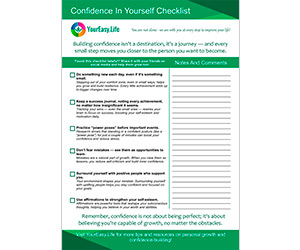
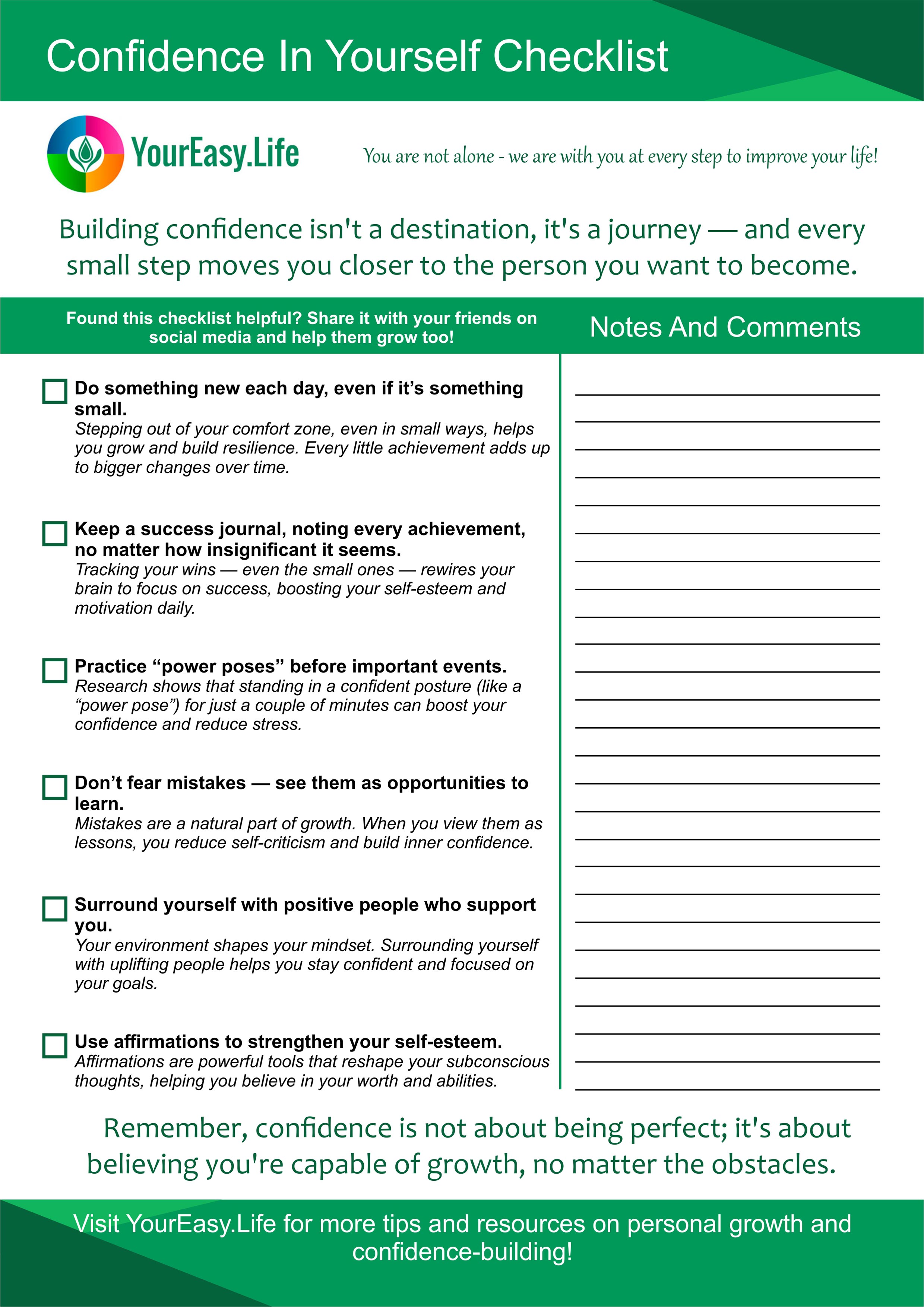
Are You Ready To Build Unshakable Confidence In Yourself?
This simple checklist is your first step toward embracing new opportunities, silencing self-doubt, and building the life you’ve always dreamed of. Download it now, and start your journey to becoming the most confident version of yourself today!

To help you start building confidence, here’s a small checklist of actions you can apply daily:
- Do something new each day, even if it’s something small.
- Keep a success journal, noting every achievement, no matter how insignificant it seems.
- Practice “power poses” before important events.
- Don’t fear mistakes — see them as opportunities to learn.
- Surround yourself with positive people who support you.
- Use affirmations to strengthen your self-esteem.
Conclusion: Confidence In Yourself Is The Key To Personal Growth
Building confidence in yourself isn’t an instant process, but each step in this direction helps you grow. Remember that confidence in yourself is a skill you can develop. Small steps, overcoming inner fears, and the support of those around you — all of this will help you gain the confidence necessary to achieve your goals.
And most importantly — start today! Every new day is a chance to become more confident and get closer to your best version.
You’re not alone on this journey. At YourEasy.Life, we’re always here to support you every step of the way toward a better life. We believe that with the right support and resources, you can achieve inner harmony and confidence in yourself. Be bolder, and together we can simplify your life and make it brighter!
Frequently Asked Questions
Scientific Research, Data And Articles
- Power Posing: Brief Nonverbal Displays Affect Neuroendocrine Levels and Risk Tolerance, Dana R. Carney, Amy J.C. Cuddy, and Andy J. Yap
- Rosenberg, M. (1965). Society and the adolescent self-image. Princeton University Press.
- Judge, T. A., & Bono, J. E. (2001). Relationship of core self-evaluations traits — self-esteem, generalized self-efficacy, locus of control, and emotional stability — with job satisfaction and job performance: A meta-analysis. Journal of Applied Psychology, 86(1), 80-92.


